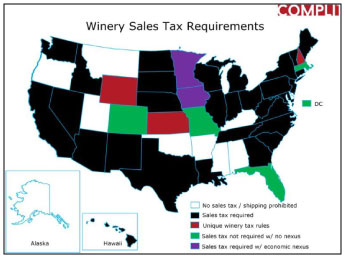Minnesota and Iowa will begin to collect sales tax from some wineries
We’re already feeling the impact of the big South Dakota v. Wayfair, Inc. Supreme Court Ruling on Internet sales tax collection. Both Minnesota and Iowa are jumping on the Wayfair bandwagon as Minnesota’s economic nexus law will take effect on October 1st, and Iowa’s will take effect on January 1st. If you make more than 100 annual shipments to Minnesota or 200 shipments annually to Iowa, please read below more important details.

Minnesota is requiring registration prior to October 1st
Minnesota’s existing “economic nexus” law, which the Minnesota Department of Revenue (DoR) believes is now constitutional because of the Wayfair decision, states that businesses that make “100 or more retail sales” or “ten or more retail sales totaling more than $100,000” from outside of Minnesota to destinations in Minnesota “during a period of 12 consecutive months” must collect and remit sales tax. In a press release issued on July 25th, the DoR states that any retailer that meets either threshold must register and begin collecting taxes “no later than” October 1st.
Iowa’s economic nexus law will take effect on January 1st
Iowa passed a new law less than a month prior to the June 21st Wayfair decision that also establishes an economic nexus provision. However, in Iowa the threshold for the small seller exception is higher – 200 transactions or $100,000 annually. On their Wayfair explainer page, the Iowa DoR states that any business that does not fall under the small seller exception should register and begin collecting taxes by January 1st.
Colorado has an economic nexus notice and reporting requirement
Colorado also has an economic nexus law on the books, but it’s different than the ones in Minnesota and Iowa. Instead of requiring sales tax registration for sellers above the threshold, Colorado requires a series of onerous reporting requirements that took effect on July 1, 2017 for sellers that are above the threshold. Wineries that sell over $100,000 (not including wholesale sales) in DTC shipments per year in Colorado have the option of either registering to collect sales tax with the DoR or to not register but comply with the notice and reporting requirements, which are listed below.
- Notify every Colorado customer each time they buy that they owe use tax on the transaction (because you’re not collecting it)
- Send each customer an annual purchase summary of the shipments they received from you (so they can pay use taxes on the shipments from you)
- Provide the Colorado DoR with an annual report detailing all of the sales you made to Colorado customers (enabling them to go after your customers for use tax)
Wayfair’s impact on wineries
As we noted in our previous blog post previewing the Wayfair arguments, wineries are already paying sales taxes in most of the states to which they are allowed to ship directly to consumers. Minnesota and Iowa were two of the seven states (also Colorado, Florida, Missouri, Massachusetts, and DC.) where wineries were not required to pay sales tax if they are shipping to consumers with no nexus. However, following the Wayfair ruling and because both states have existing economic nexus laws, we updated the map to add a new category for economic nexus states.
Believe it or not, these changes for wineries are relatively small compared to the significant changes that non-wine sellers will experience. However, we expect significant changes coming out of state legislatures over the coming year as states look to take advantage of the ruling in Wayfair. Of course, there’s also the possibility that Congress will act to provide some standards that states can follow. We’ll keep you updated here if anything results in a change to the status quo for wineries.
We’re here to help
Compli clients should know that we’re here for you and can help you navigate these changes. We’ll be reaching out to you proactively based on the number of shipments you make to these economic nexus states and will handle the sales tax registrations in the states that you need. If you have any questions, as always just reach out to your Customer Success Manager. If you’re not yet a Compli client, please contact us for more information.

The Avalara Tax Changes midyear update is here
Trusted by professionals, this valuable resource simplifies complex topics with clarity and insight.
Stay up to date
Sign up for our free newsletter and stay up to date with the latest tax news.














